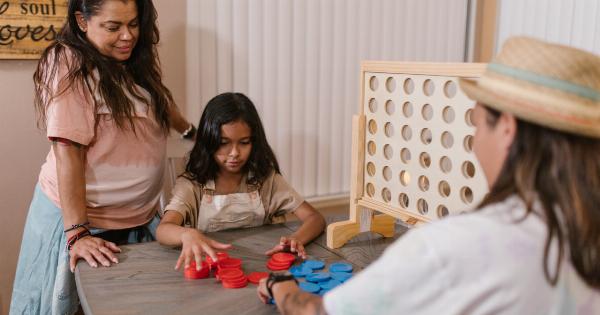Dementia is a collective term used to describe various symptoms of cognitive decline, such as memory loss and difficulty in thinking, problem-solving, or language capabilities.
It affects millions of people worldwide and can have a significant impact on individuals, their families, and wider society.
While there is currently no cure for dementia, scientists and researchers constantly strive to uncover ways to prevent or slow down its progression.
Interestingly, recent studies have highlighted the role of certain partner characteristics in potentially defending against dementia. These findings provide a fresh perspective and shed light on a potentially unexpected defense mechanism.
The Power of Emotional Support
One crucial protective aspect of having a partner is the emotional support they can provide. A study conducted by the University of Utah revealed that emotional support from a spouse or partner can reduce the risk of developing dementia later in life.
The study followed a group of older adults for several years and found that individuals with high levels of emotional support had a lower risk of dementia, even when controlling for other dementia-related factors.
Emotional support can come in various forms, such as receiving understanding, empathy, and encouragement from a partner. It creates a sense of belonging, security, and reduces feelings of loneliness or isolation.
These factors undoubtedly contribute to overall mental well-being, which may have protective effects against dementia. The presence of emotional support can also lead to reduced stress levels, which further benefits brain health.
The Importance of Intellectual Stimulation
Intellectual stimulation plays a vital role in cognitive health and can have a protective effect against dementia.
Engaging in mentally challenging activities keeps the brain active and may build cognitive reserve, making it more resilient to age-related cognitive decline. Having a partner who encourages intellectual stimulation can make a significant difference in maintaining cognitive abilities.
Studies have revealed that participating in activities such as puzzles, reading, learning new skills, or even having intellectual discussions can help preserve cognitive function.
Sharing intellectual interests and engaging in mentally stimulating activities with a partner may stimulate the brain and contribute to long-term brain health.
The Social Connection and Dementia
Loneliness and social isolation have been identified as risk factors for dementia. In contrast, maintaining social connections and engaging in active social lives have shown protective effects against cognitive decline.
Having a partner who fosters a rich social environment can positively influence an individual’s cognitive health.
Partners can offer opportunities for social interaction, whether it be through joint activities, gatherings with friends, or involvement in community events.
Social engagement can help maintain cognitive function by promoting mental agility, stimulating brain activity, and boosting overall well-being.
Shared Lifestyle Habits
A shared lifestyle between partners can also play a critical role in defending against dementia. Research has linked specific lifestyle factors to a reduced risk of cognitive decline.
When partners adopt and maintain healthy habits together, they establish a supportive environment conducive to brain health.
Regular physical exercise has consistently been associated with improved cognitive function and a decreased risk of dementia.
By engaging in physical activities together, partners can motivate and hold each other accountable to a more active lifestyle, which benefits both body and mind.
Additionally, a healthy diet, rich in fruits, vegetables, whole grains, and omega-3 fatty acids, has been linked to a decreased risk of cognitive decline.
When partners prioritize nutritious meals and make healthy food choices together, they create a nourishing environment that promotes brain health.
The Power of Love and Commitment
The power of love and commitment in defending against dementia cannot be underestimated.
Research suggests that being in a supportive and loving relationship can positively impact an individual’s overall well-being, including mental health and cognitive function.
A study conducted at Northwestern University found that individuals in long-term, happy marriages had a lower risk of developing Alzheimer’s disease compared to those in unhappy marriages or single individuals.
The positive emotional experiences, reduced stress levels, and the sense of belonging that result from a loving partnership contribute to better brain health and resilience against cognitive decline.
The Role of Communication
Open and effective communication with a partner can also have a protective effect against dementia. Engaging in regular conversations and discussions stimulates cognitive processes, memory retrieval, and linguistic capabilities.
Studies have shown that individuals who engage in frequent and meaningful conversations are more likely to maintain better cognitive function and have a reduced risk of developing dementia.
By actively listening, engaging, and exchanging ideas, partners promote mental agility and support each other’s cognitive abilities.
Shared Responsibility and Stress Reduction
Dementia caregiving can be physically and emotionally challenging, often leading to high levels of stress for the primary caregiver.
However, having a partner who shares the caregiving responsibilities and supports the primary caregiver plays a crucial role in stress reduction.
When partners work together as a team, they can alleviate the burden of caregiving, allowing the primary caregiver to have necessary breaks and opportunities for self-care.
Effective teamwork reduces stress levels and helps protect against the negative impact of chronic stress on cognitive function.
The Power of Positive Attitude
Having a partner with a positive attitude towards aging and life in general can also contribute to defending against dementia. A positive mindset can influence lifestyle choices and resilience in the face of challenges.
Research has shown that individuals with optimistic outlooks are more likely to engage in healthier behaviors, such as regular exercise, maintaining social connections, and adopting a balanced diet.
These choices positively impact cognitive health and reduce the risk of dementia.
The Gift of Unconditional Love and Support
Perhaps one of the most significant ways a partner’s characteristics can defend against dementia is through the gift of unconditional love and unwavering support.
Having a partner who is genuinely committed, understanding, and compassionate creates an environment that promotes emotional well-being and overall resilience.
When individuals feel loved and supported, their stress levels decrease, enhancing brain health. A loving partnership provides a buffer against the negative impact of stressful life events, fostering emotional and cognitive well-being.
Conclusion
While the fight against dementia continues, exploring the unexpected ways a partner’s characteristics can potentially defend against cognitive decline offers hope and valuable insights.
Emotional support, intellectual stimulation, social connections, shared lifestyle habits, love and commitment, effective communication, shared responsibility, positive attitudes, and unconditional love all contribute to creating an environment that promotes brain health and defends against dementia.
As we navigate life with our partners, it is essential to cherish and nurture these qualities, as they not only strengthen our relationships but also potentially protect against the devastating impact of dementia.































